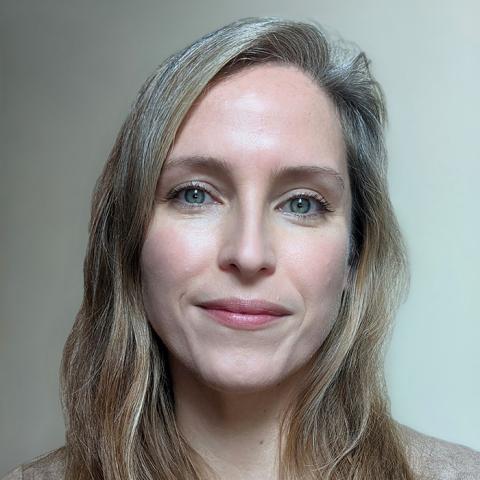Karen Milchus



Artificial Intelligence; Cognitive Systems; Visual Representations

Leigh McCook, principal research associate at Georgia Tech, also serves as deputy director for IPaT, director of STEM programs for the Georgia Tech Research Institute (GTRI), and previously served as division chief for fifteen years in GTRI’s socio-technical systems division in the Information and Communications Lab. She has been with Georgia Tech for more than 30 years.
As deputy director in IPaT, McCook works to build new research partnerships across campus as well as develop government, industry, and international programs. While she continues to conduct research, McCook's focus has centered on growing IPaT’s research portfolio of state government and industry projects, particularly in education, humanitarian systems, health and smart cities.
McCook’s GTRI activities include directing research and outreach programs for regional and national centers and managing a variety of research and STEM programs funded by federal, state, and local agencies.
Her career expertise includes technology transfer, research translation, outreach, planning, and program management, specifically in areas related to emergency preparedness and response, homeland security, community resiliency, and education. She has managed researchers working a variety of programs in health, learning technology, planning, technology assessment, and integration, policy analysis and research, technology transfer, education, training, public safety, humanitarian, and emergency response.
McCook served as program manager for the Georgia Emergency Management Agency (GEMA) Homeland Security/Emergency Response programs at the Georgia Tech Research Institute since 2000. Twenty years of program support to GEMA has resulted in over $53M work of funded project work at GTRI.
McCook’s experience also includes having served as associate director for technology transfer and outreach for EPA’s Hazardous Substance Research Centers (South & Southwest). In this capacity she led technology transfer, research translation, and outreach activities for the five-university consortium.
McCook has served as principal investigator (PI) or co-PI on projects for the Centers for Disease Control and Prevention, the Georgia Department and Family and Child Services, the Governor’s Office of Student Achievement, the Atlanta Urban Area Security Initiative, and the Department of Homeland Security (DHS) Southeast Regional Research Initiative.
Education; Humanitarian Systems

Celeste Mason is a research scientist II at the Institute for People and Technology (IPaT). After completing her Masters of Human-Computer Interaction at Georgia Tech (and previously, a Bachelor’s in Materials Science and Engineering), she worked as a researcher/developer at a wearable computing startup and universities in Northern Germany. Research projects included design and development of technologies for intelligent assistance in physical training for older adults, with an emphasis on realistic intelligent virtual agents and dynamic user feedback; creation of a multi-modal dataset for action recognition and semantic/hierarchical structure discovery, with the goal of enhancing cognitive robotic planning algorithms; user interfaces, wearable, and tangible systems for the “Workflow Editor” graphical procedural customization system for order-picking and other industrial processes (now part of Teamviewer); and the collaborative research projects “Multimodal Algebra Lernen (MAL)”, a tangible mathematics educational system; and “Be-griefen”, an experimentation XR educational system for physics and electronics instruction.
Some of the projects Celeste has worked on at Georgia Tech include PopSign (an American Sign Language vocabulary learning mobile game - the initial prototype was the basis of her Masters project), along with the Passive Haptic Learning and Rehabilitation project (PHL/PHR Gloves help to teach the "muscle memory" of how to play piano melodies without the learner's active attention and may aid those recovering from stroke injury and other conditions improve sensation/dexterity in their affected hands), the FIDO project (tangible and wearable systems for working dogs), and the CHAT project (wearable computers used by dolphin researcher). Prior Materials Science research projects focused on design, fabrication, and characterization of piezo-electric nanogenerators, bio-inspired nanomaterials and optically transparent, electrically conductive nanoparticle/polymer composites. Her current research focuses include educational games, tools, and outreach (especially in the STEM space); assistive technologies for health, education and industry; environmental sensor systems for community-driven sustainability; and wearable (AR/XR) and implantable technologies for health, productivity, and quality-of-life/well-being. Celeste continues to pursue technology transfer efforts for these projects (PHL Gloves and PopSign in particular) with the goal of building up and refining these research prototypes toward viable products that can significantly improve and enrich users’ daily lives.
Research Interests:

Lisa Marks is a designer and educator teaching studio courses in the undergraduate and graduate programs at Georgia Tech. Her current research focuses on methods of combining endangered and traditional handcraft with algorithmic modeling in order to produce new modes of production. She has a Master of Industrial Design from Parsons School of Design and worked in New York for clients including Google, Nike, and Swarovski. Marks serves as a Georgia Tech Institute for People and Technology initiative lead for research activities related to arts, expression, and creative technologies.



Christopher J. MacLellan is an Assistant Professor in the School of Interactive Computing at Georgia Institute of Technology, where he leads the Teachable AI Lab (TAIL; https://tail.cc.gatech.edu). His work on cognitive systems aims to advance our understanding of how people teach and learn and to build AI systems that can teach and learn like people do and in ways that are compatible with people. He explores the development of computational models of learning and how these models can support the development of AI technologies, such as intelligent tutoring systems and medical decision support systems, at scale.
He also investigates how data collected about how people learn and make decisions can be leveraged to drive the development of better cognitive models and computational learning systems. Chris has been a principal investigator on multiple sponsored project awards with DARPA, the U.S. Army, ONR, and NSF. He has also received external recognition for his work, such as the 2022 EAAI Now and Future AI Educator award as well as being named on the 2021 Technical.ly RealLIST of technologists building Philadelphia’s future.
Prior to his position at Georgia Tech, Chris was an Assistant Professor of Information Science and Computer Science (by co-appointment) at Drexel University. Before that, he completed his PhD in Human-Computer Interaction at Carnegie Mellon University's School of Computing, where he was a fellow in the Program for Interdisciplinary Education Research (PIER).
The products of his work have immediate implications for AI-powered technology development. For example, through his work with the NSF-funded AI ALOE Institute, Chris is developing tools that let teachers build AI-powered tutors by naturally teaching an AI agent rather than programming. His work also has many broader implications, such as enabling doctors to support the development of AI-powered diagnoses tools where few training examples are available (DARPA-funded POCUS project) and for creating personal assistant agents that can engage in collaborative learning to support more effective human-machine teaming (ARL-funded STRONG project).
Research Areas:
Artificial Intelligence; Cognitive Systems; Cognitive and Learning Sciences; Human-Computer Interaction; Learning Technology.


Yanni Loukissas is an Associate Professor of Digital Media in the School of Literature, Media, and Communication at Georgia Tech. His research is focused on helping creative professionals think critically about the social implications of emerging technologies. His forthcoming book, All Data Are Local: Thinking Critically in a Data-Driven Society (MIT Press, 2019), is addressed to a growing audience of practitioners who want to work with unfamiliar sources both effectively and ethically. He is also the author of Co-Designers: Cultures of Computer Simulation in Architecture (Routledge, 2012) and a contributor to Simulation and its Discontents (MIT Press, 2009). Before coming to Georgia Tech, he was a lecturer at the Harvard Graduate School of Design, where he co-coordinated the Program in Art, Design and the Public Domain. He was also a principal at metaLAB, a research project of the Harvard Berkman Center for Internet and Society. He has taught at Cornell, MIT, and the School of the Museum of Fine Arts. Originally trained as an architect at Cornell, he subsequently attended MIT, where he received a Master of Science and a PhD in Design and Computation. He also completed postdoctoral work at the MIT Program in Science, Technology and Society. Website: http://loukissas.lmc.gatech.edu/